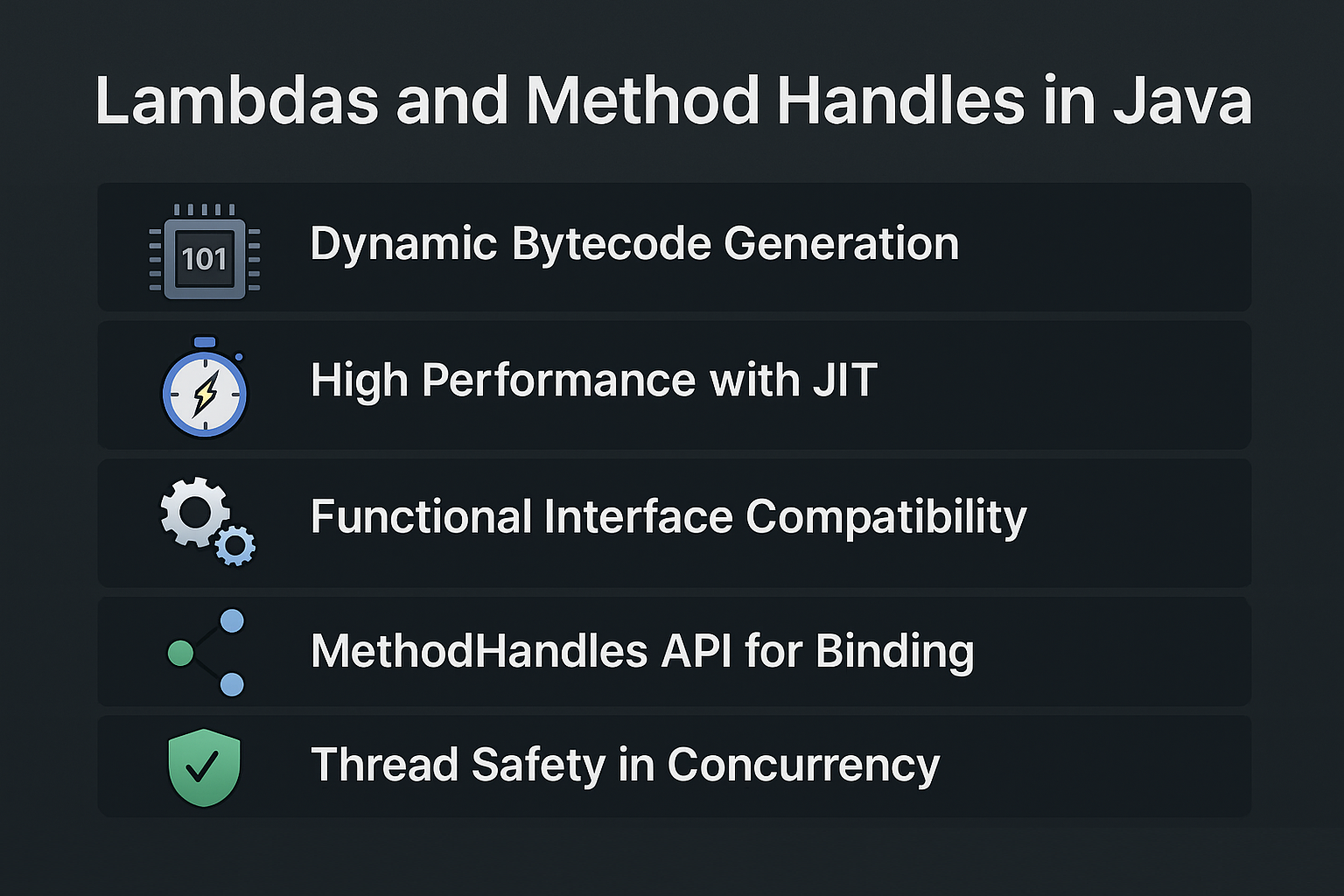Java lambdas may look simple, but under the hood, they unleash an advanced, high-performance mechanism using the java.lang.invoke package—especially MethodHandles and LambdaMetafactory.
This tutorial takes you behind the scenes of lambda execution and shows how MethodHandles empower lambdas to be as fast and flexible as hand-written bytecode.
🚀 Introduction: Why Method Handles Matter in Lambdas
When you write a lambda like:
Runnable r = () -> System.out.println("Hello");
It feels like syntactic sugar. But this line actually triggers dynamic bytecode generation using invokedynamic, method handle chains, and a factory called LambdaMetafactory. This system enables the JVM to generate and optimize lambdas at runtime, resulting in:
- Faster startup
- No synthetic class pollution
- JIT-optimized performance
- Better scalability in frameworks
Understanding this enables you to write high-performance, dynamic, and clean Java code.
🔍 What Is a Method Handle?
MethodHandle is a type-safe, low-level reference to a method, constructor, or field. Introduced in Java 7 as part of java.lang.invoke, it replaces reflection with faster, safer alternatives.
MethodHandles.Lookup lookup = MethodHandles.lookup();
MethodHandle handle = lookup.findStatic(Math.class, "abs", MethodType.methodType(int.class, int.class));
int result = (int) handle.invokeExact(-5); // result = 5
🧠 How Lambdas Use Method Handles
When you compile a lambda, the JVM uses:
invokedynamicbytecode instruction- A bootstrap method from
LambdaMetafactory MethodHandlesto bind the target method- A synthetic functional interface implementation (at runtime)
This avoids inner classes and allows dynamic linkage and optimizations.
🧪 Functional Interface Compatibility
Lambda expressions in Java are used to implement functional interfaces—interfaces with a single abstract method (SAM):
@FunctionalInterface
interface Greeting {
void sayHello();
}
Greeting g = () -> System.out.println("Hi!");
The lambda body is compiled to a method, and a MethodHandle is used to link it to the interface method.
🧩 Common Functional Interfaces
From java.util.function:
Function<T, R>Consumer<T>Predicate<T>Supplier<T>UnaryOperator<T>BiFunction<T, U, R>
All are optimized with method handles behind the scenes.
🔄 Method Handles vs Reflection
| Feature | Reflection | MethodHandles |
|---|---|---|
| Performance | Slower | Much faster |
| Type safety | None | Type-safe |
| Exception behavior | Checked | Runtime errors |
| Dynamic invocation | Yes | Yes |
| Use in lambdas | No | Yes |
🧵 Lambdas, Method Handles, and Concurrency
Lambdas and method handles are thread-safe if:
- Captured variables are effectively final or immutable
- No mutable shared state is referenced
- Invocation is stateless (pure functions)
This makes them ideal for concurrent stream operations and thread pool tasks.
🔧 Creating MethodHandles Manually
import java.lang.invoke.*;
public class HandleExample {
public static void print(String s) {
System.out.println("Hello " + s);
}
public static void main(String[] args) throws Throwable {
MethodHandles.Lookup lookup = MethodHandles.lookup();
MethodType mt = MethodType.methodType(void.class, String.class);
MethodHandle mh = lookup.findStatic(HandleExample.class, "print", mt);
mh.invokeExact("Ashwani");
}
}
🧠 Real-World Analogy: Lambda as Delegator
Think of a lambda as a personal assistant (functional interface) that delegates a task (method handle) to a real worker (method). You don’t write the assistant class—the JVM generates it on demand using LambdaMetafactory and MethodHandles.
🏗️ Dynamic Code with LambdaMetafactory
You can build lambdas at runtime dynamically!
import java.lang.invoke.*;
public class DynamicLambda {
public static String greet(String name) {
return "Hi " + name;
}
public static void main(String[] args) throws Throwable {
MethodHandles.Lookup lookup = MethodHandles.lookup();
MethodType invokedType = MethodType.methodType(Function.class);
MethodType methodType = MethodType.methodType(String.class, String.class);
MethodHandle mh = lookup.findStatic(DynamicLambda.class, "greet", methodType);
CallSite site = LambdaMetafactory.metafactory(
lookup,
"apply",
invokedType,
MethodType.methodType(Object.class, Object.class),
mh,
methodType
);
Function<String, String> greeter = (Function<String, String>) site.getTarget().invokeExact();
System.out.println(greeter.apply("Ash"));
}
}
📌 What's New in Java?
Java 8
- Lambdas,
invokedynamic,LambdaMetafactory,MethodHandles - Functional interfaces:
java.util.function
Java 9
- Stack walking enhancements (relevant for reflective calls)
MethodHandleProxiesfor interfacing with reflection
Java 11
- Improved JIT optimizations for method handle chains
Java 17
- Sealed classes enhance functional dispatch safety
Java 21
- Virtual threads fully compatible with lambda-based concurrency
- Scoped values aid functional purity with method handles
✅ Conclusion and Key Takeaways
- Lambdas in Java are powered by MethodHandles, not synthetic classes.
MethodHandleis faster and more type-safe than reflection.LambdaMetafactorydynamically binds lambdas to functional interfaces.- Method handles unlock powerful patterns: runtime code generation, high-performance frameworks, and dynamic proxies.
- Understand these internals to write optimized and elegant Java code.
❓ Expert FAQ
Q1: Are lambdas compiled into classes?
No. Lambdas use invokedynamic and are instantiated at runtime via LambdaMetafactory.
Q2: What is a MethodHandle?
A type-safe, low-level reference to a method, constructor, or field.
Q3: How does MethodHandle differ from Reflection?
It’s faster, safer, and more predictable—ideal for JVM-optimized code.
Q4: What is LambdaMetafactory?
A factory that binds lambdas to their functional interface using method handles.
Q5: Can I generate lambdas at runtime?
Yes, using LambdaMetafactory and MethodHandles.
Q6: Are method handles used in frameworks?
Yes, frameworks like Spring, Micronaut, and bytecode libraries use them for fast dispatch.
Q7: Is it safe to use method handles across threads?
Yes, as long as shared state is immutable or synchronized.
Q8: Can method handles replace reflection in all cases?
Mostly, except where runtime type introspection is needed.
Q9: Do lambdas improve performance over anonymous classes?
Yes—less bytecode, better JIT optimization, and no class loader overhead.
Q10: Can I use method handles in Java agents?
Absolutely—they are essential for low-level, performant instrumentation.
